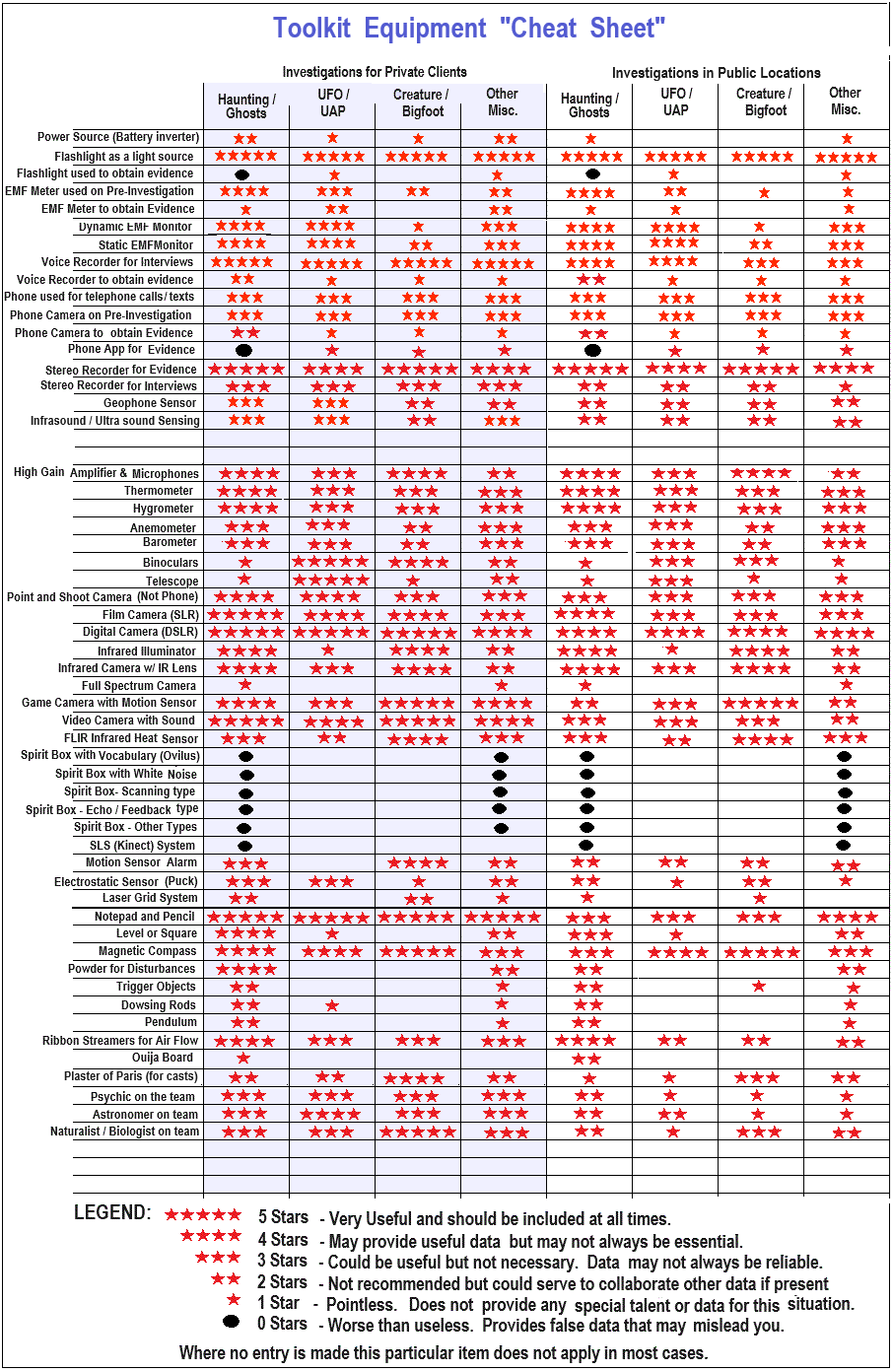
|
 |
Volume Two - Choosing Your Equipment ( and not wasting your money )
One of the first things most people just starting out ask is, "What Do I need in the way of equipment?" They go online and see a lot of stuff that claims to be built for paranormal investigating. It becomes a major project trying to sort through all this. Some is actually good, some is a waste of time, and some is just junk from people trying to capitalize on your confusion. That is the purpose of this Volume. It will sort through all the options and list what works and what fails to do what it claims . It's not popular with a lot of the people selling "Ghost Gadgets" and other such snake oil. This volume will call it like it is. I have tested and evaluated this stuff over the years and compiled a list of what is good and what is not so good along with the reasons why. Where does your favorite piece of equipment stack up on the list? Read on to find out. This volume is divided into two sections. The first is a "Cheat Sheet" of sorts. I have ranked many types of equipment based on its usefulness on various types of investigations. Of course I considered its functionality; Does it actually do what is claimed. But I also weighed that against its ease of use, how much trouble it was to set up in each case, and also the type of case where it is used. How applicable would it be in that environment? These considerations determine where I put it on the list. If all you want is a quick reference, take a look at the first part of this volume. It is a "Cheat Sheet" that ranks each device based on its use. A few are listed more than once because they are used in different ways by different investigators. You can determine where the device ranks based on your intended use. The "NEXT CHAPTER" button on the left will take you to the second, more extensive, section of this volume. It will delve into how this applies on your investigation. It digs into the theory of operation as well as why some devices are recommended or not. A lot of what is popular today is junk science. These will be debunked here along with the reason why provided. If you disagreed with some of my rankings in the first section chart, take a look at the second. It will outline exactly why it earned its spot on the list. The Equipment Cheat Sheet The table below provides a list of equipment. It does not go into detail about it; it only provides a rating, based on reliability, use, type of investigation you are doing. If you want details on these recommendations go back to the Index and select the particular device in which you are interested and read the report located there. (If you don't see it here, check out Volume 3 which picks up where Volume Two leaves off. it will cover a few more items some use including a couple Old School methods.) If you disagree with my selections, feel free to use the Contact Me button to pass along your concerns. But I would suggest before you do, read the detailed report here or in Volume 3 if one is available. The rating was determined based on three factors. First of course is whether the device in question functions as claimed for it. It has to work! If it doesn't then everything else is a moot point. Secondly, I took into account how easy it is to use versus what evidence it provides. Something large and cumbersome is often more trouble than it is worth taking on an investigation. The third factor is the investigation itself and how well it lends itself to using that particular equipment or method. For instance, it may be difficult to make a cast of a track if one is being rushed through or other people may disturb your work before it can be completed. In the case of private investigations a personal interview is more important to the outcome than it would be if you were investigating a public "Pay-To-Play location. Finally, the credibility of the evidence is usually much lower at a public location since you usually don't have control over everyone present. However if you reserved the entire location for you and your team only, and nobody else was present, then maybe that last statement doesn't apply. I made my evaluation under a worst case scenario so you may need to adjust them to suit your situation. I should also point out that at the end I listed a few people with certain skills or ability. These people may be able to contribute greatly based on their ability, however in a few situations I rated them low. This was not due to their inability; rather it was based on the location in question. In a structured group investigation often there is little opportunity for others to contribute. The program is set. In other words, if you are on a group investigation the sponsoring organization may limit outside contributions. On a private case these same professionals may be vital as consultants.
|

|
|
The NEXT CHAPTER Button on the left will take you to Part Two of this volume. It will provide the details of each of the methods and equipment posted on the List above as well as the reason behind why it was ranked as it was. |


